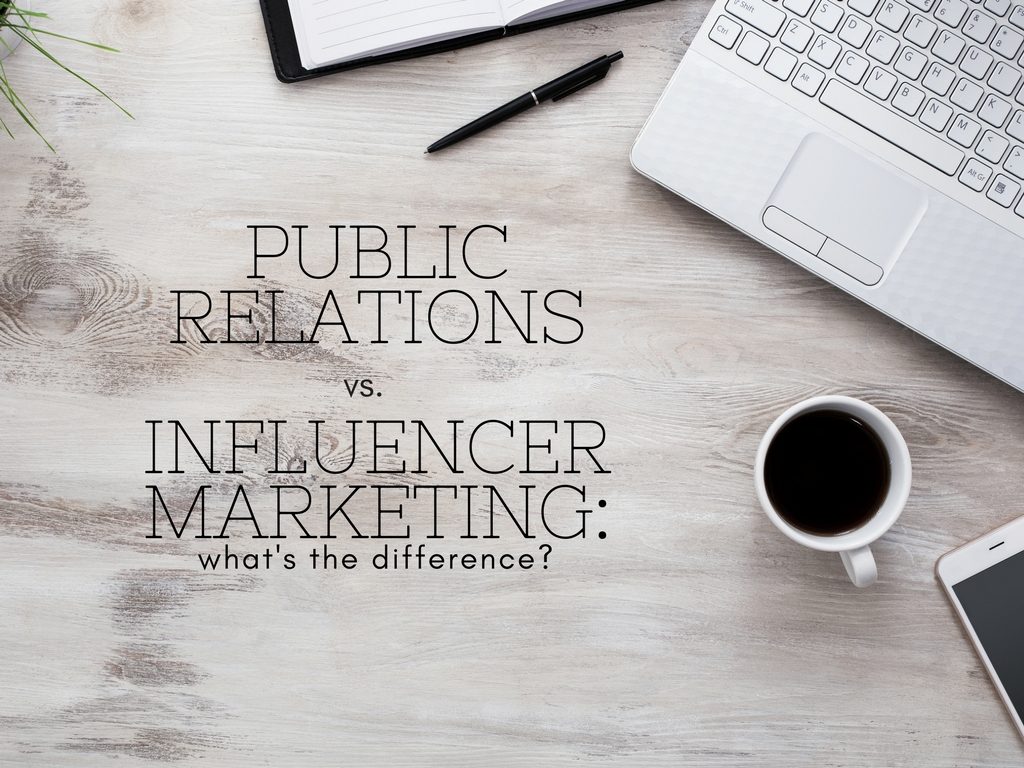
Public Relations vs. Influencer Marketing: What’s the Difference?
Marketing your business is not as simple as it once was. Within the past year alone, numerous new strategies – from influencer marketing to social media advertising – have become prominent. These new methods of marketing have given brands a plethora of options to choose from. However, the expansive options have also made it difficult for brands to decide what works best.
One of the biggest struggles business owners often face is deciding between traditional public relations (PR) and the hot marketing trend of 2017, influencer marketing. On the surface, the two seem surprisingly similar: both involve promoting a brand/product through another source; both require contacting outlets and making connections; and both can help grow your business and your fanbase.
Let’s break both down into a little more detail.
Public Relations
Public Relations, typically referred to as PR, is a “strategic communication process that builds mutually beneficial relationships between organizations and their publics,” as defined by the PRSA. In simpler terms, PR helps build connections between a brand and a variety of media outlets.
PR professionals build these connections by developing relationships with members of the media at said media outlets. They then send pitches of products and story ideas to relevant recipients in the hopes that an outlet will pick up the story and create publicity around the brand/product.
The upside of PR is that it has unlimited potential, especially in today’s word of social media. A story about a certain product or brand might be shared hundreds of times, go viral, or become an Internet sensation thanks to one well-placed pitch. The downside of PR is that nothing is guaranteed. Yes, your brand might skyrocket after some great earned media, or it might take two years to receive a placement.
With PR, the media outlets control everything. Those journalists, editors and publishers decide what they want to talk about, and which products and brands they want to interact with. This factor makes it nearly impossible to guarantee placement with specific outlets.
Influencer Marketing
Influencer marketing, on the other hand, comes with a guarantee – but it also comes with a price.
You have much more control over when, where and how your product/brand will be seen when working with an influencer. You can reach out to specific influencers and ask them to promote your product in a certain way. Then, once you’ve come to an agreement with the influencer of your choosing, you have a guarantee your product will be featured on this influencer’s channels. You receive this guarantee because you’re paying for it.
Influencers can charge anywhere from $500 to upwards of $100,000 for a sponsored post. The best way to look at influencer marketing is like another form of advertising. Just like you would pay for a print or digital advertisement, you pay for a post.
With influencer marketing, however, what you pay for is what you get. If you agree to one sponsored post, you’ll get one sponsored post and that’s it. Whereas with PR, if a journalist likes your product or an article about your brand is popular, he/she may want to write about you again in the future. With influencers, repeat posts (for no charge) are pretty uncommon.
Which one is best?
Both public relations and influencer marketing have pros and cons. Which one is best depends largely on what your brand is looking for.
If you’re looking to build brand awareness and get the word out about your product, PR is a great way to go. In this case, it doesn’t matter as much which outlets specifically pick up stories about your brand or choose to feature your product. It’s still good to stay on target, but your goal here isn’t to work with one particular influencer. If your goal is to work with one particular influencer, obviously influencer marketing is the best choice for you.
PR is also a good choice if timing isn’t urgent. Public relations is a marathon, not a sprint. It can take months to get the ball rolling and start seeing results. If you’re willing to give it some time, PR can result in some incredible benefits for your business. However, if you want to see your product featured next week, influencer marketing is your best bet. Because you’re paying for placement, you have much more control over when your product will be featured.
In the end, both PR and influencer marketing have the goal of promoting your product/brand. Deciding which one is right for you may take some time, but one thing is clear: advertising, whether that be PR, influencer marketing, print or digital, is an essential part of growing any business.


